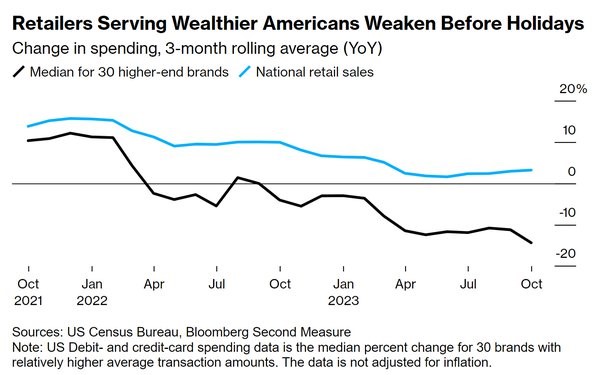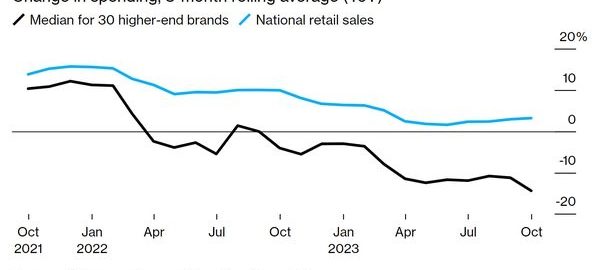Data Shows Consumers Plan To Cut Holiday Spending

It’s never a good time for Google to confirm a reporting bug in Google Search Console — especially just days before the long Thanksgiving holiday weekend, when consumers have cut budgets and brands are trying to figure out how their campaigns will attract those willing to spend.
Google’s bug, identified Tuesday, impacts experience and enhancement reports, including the core web vitals, mobile usability, HTTPS, AMP and others. It shows a drop in the number of valid URLs being reported.
The company said it is working to fix the problem.
Happy Thanksgiving — almost — and welcome to the unpredictability that lies ahead during the long holiday weekend.
Bloomberg ran some interesting numbers. In the three months prior to the holiday shopping season, a group of retailers that cater to the upper middle class — Apple, Coach, and Nordstrom — experienced the biggest sales drop in two years, according to analysis of Bloomberg Second Measure data.
The decline also hit top-performing malls in wealthier areas, even as overall retail-sales figures rose, the data shows.
How do you set a media plan for this type of unexpected decline?
Bloomberg points out that Kohl’s reported its seventh straight drop in comparable sales, as a partnership with Sephora drew in customers but did not spur them to spend more. Best Buy, known for its electronics, on Tuesday said its same-store sales will fall between 3% and 7% in the fourth quarter.
Kayla Bruun, a senior economist for survey research firm Morning Consult, told Bloomberg that people with at least $100,000 in household income are starting to become more frugal.
This is the opposite of the data presented by digital agency Adtaxi. The agency suggests that its data shows a shift in its data among households earning more than $100,000 annually, with twice as many individuals planning to increase their holiday spending.
When consumers were asked how much they planned to spend on holiday shopping compared to last year, a majority of households below the $75,000 income threshold claimed they were inclined to reduce their holiday spending compared to the previous year.
Those with annual income of $75,000 to $99,000 the data shows an uptick in the average holiday spending.
Results from the company’s 2023 Holiday Shopping Survey call attention to an “unexpected boost in sales,” particularly when categorizing respondents by household income.
The Adtaxi survey was conducted online using Survey Monkey, among a sample of 1,137 adult respondents. The surveyed population is balanced across U.S. geographic regions, income levels, gender and age. The survey was fielded on November 2, 2023.
LoopMe’s data is a little more on track with what Bloomberg sees. Only 13% participating in a LoopMe UK survey of 2,963 consumers between September 7 through 9, 2023, said they will buy some sort of electronics, 21% citing cosmetics and fragrance, and 38.2% cited clothes and footwear as on top of their shopping lists.
The LoopMe survey insights show 68% of consumers are considering not participating in this year’s Black Friday and Boxing Day sales. The latest data could indicate consumer caution on spending, a sign that they are not as keen on shopping sales events this year.
Consumers are especially cutting back on luxury goods in 2023, with a considerable decrease in interest from the previous year. This year, only 38% of consumers said they might consider buying luxury goods during the Black Friday and Christmas period, down from 77% in 2022.
Among shoppers who do plan to shop the sales in the run-up to Christmas, 38.2% cited clothes and footwear as on top of their shopping lists. followed by 21% citing cosmetics and fragrance, and 13% electronics.
Only 11.2% plan to buy jewelry and 9% during the holidays. Handbags and accessories have seen the least interest, 7.6%, indicating consumers are focused on necessities this year and cutting back on luxuries.
Only 1 in 3 consumers plan to use a credit or buy now pay later offer to aid their Christmas spending. Meaning, 68.5% still don’t feel comfortable going into debt to aid Christmas spending.
LoopMe data from the U.S. survey based on 4,835 respondents shows plan to purchase electronics and toys, while December holiday shoppers will mainly shop for apparel. Nearly two-thirds of consumers planning their expenses intend to spend the same or more as compared with last year. Those in the U.S. who plan to spend more this year favor more expensive items in categories such as electronics, travel, and automotive.
Even more interesting, the youngest–ages 18 to 24–plan to shop more in stores than online. They are 21% more likely than the average consumer to shop in-store this holiday season. They are also more likely to spend more.
Online retailers are the first place consumers will look for items and search engines have become the last, 35% vs. 17%, respectively.
(1)





